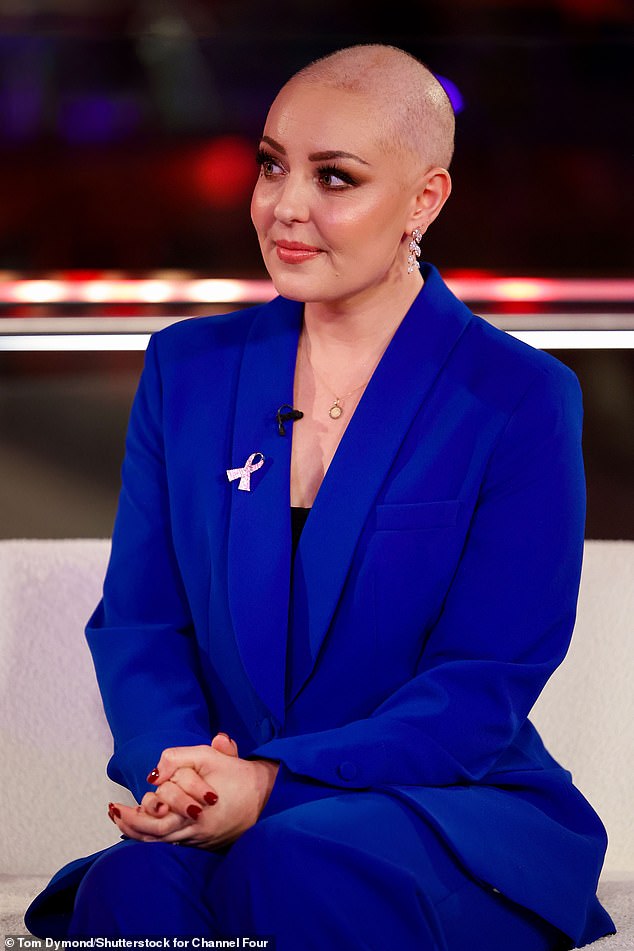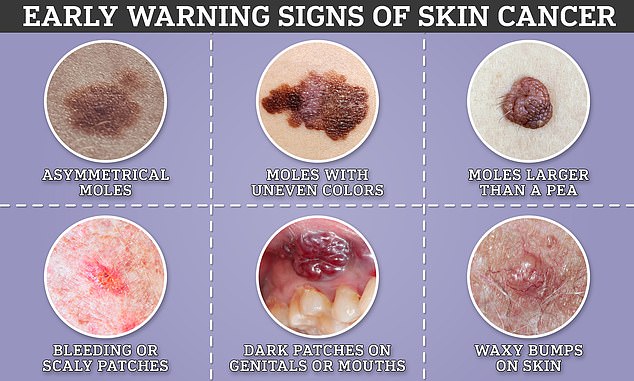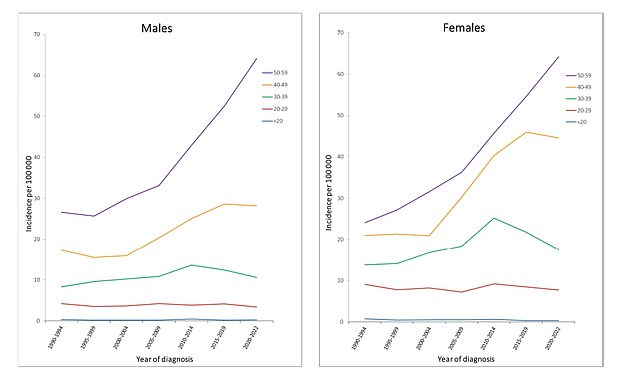Despite fears of a rise in cancers among young people, at least one form of the disease appears to be declining among those under 50.
Rates of deadly skin cancer are falling rapidly among young people, according to a major new study involving 90,000 people.
This goes against a worrying trend of rising rates of some types of disease, particularly breast, lung and bowel cancer. Over the past two decades, the number of Britons under 50 diagnosed with bowel cancer has risen by 24 per cent.
In the new study, experts at Sweden’s Karolinska Institute analyzed national data tracking cases of the most serious type of skin cancer, melanoma, which is caused primarily by overexposure to UV radiation from the sun, over time.
Tracking data on men and women from 1990 to 2022, they found that starting in 2015, cancer rates declined significantly in those under 50, particularly in women.
A new Swedish study shows that skin cancer rates are declining among young people, a pattern that is also being replicated in the UK.

Strictly professional Amy Dowden was diagnosed with breast cancer, underwent a mastectomy and nearly died of sepsis.
The biggest change was seen among young people aged 20 to 29 and 30 to 39, who saw declines in disease incidence rates of up to five percent.
By the end of the study, melanoma rates had dropped to 18 cases per 100,000 women and 10 cases per 100,000 men, decreases of 5.2 percent and three percent respectively.
For women aged 20 to 29, the data showed a 5.2 percent decline to seven cases per 100,000, while men remained stable at three cases per 100,000.
Melanoma rates in the 40- to 49-year-old group did not decline dramatically, but were seen to level off starting in 2015.
For young people under 20, a demographic that includes children, rates did not change, but the authors noted that cases were rare nationwide, with fewer than one case per 100,000 people.
In contrast, rates of the disease overall increased among those over age 50 during the same period.
Karolinska cancer expert Dr Hildur Helgadottir said: “We can see a change of trend in young adults around 2015, where incidence curves are falling.”
“This is the first time we have seen this in Sweden and we are the first European country to report a decline.”
While the data cannot provide a direct reason for the rates, Dr. Helgadottir and his colleagues suggested that four factors could be at play.
The first was the potential success of the country’s sun protection campaign, which urges people to take precautions such as using sunscreen on sunny days.
Another factor was the decline in the use of tanning beds in Sweden, as well as the fact that young people are spending more time indoors due to the increasing use of mobile phones and computers.
The final factor Dr Helgadottir suggested was that immigration meant Sweden was seeing an influx of younger people with darker skin that was better able to withstand the sun.
He added that the results also showed the need to continue to emphasize the importance of sun protection to hopefully reduce the incidence rate among older demographic groups.
Data from the charity Cancer Research UK (CRUK) also shows a small decline in melanoma rates among younger Britons in recent years.
The most recent data, from 2017 to 2019, shows there are around 15 cases per 100,000 people among Britons aged 25 to 49.
This is a decrease from the peak of 16 cases per 100,000 people in this age group recorded between 2014 and 2016.
A similar decline was also recorded among those under 24, with rates falling from 1.4 cases per 100,000 in 2004–2006 to just under one case per 100,000 in the most recent data series.
The risk of cancer increases with age, but young people, defined as those under 50, are not immune.
Although it remains rarer overall than in older age groups, experts have expressed concern about an unexplained rise in cancers, including colon cancer, among young adults.
CRUK data shows the incidence rate of the disease among younger Britons (aged 25-49) is now just over 162 cases per 100,000 people each year.
This figure is 22 percent more than in the 1990s.
And experts say this increase cannot be attributed solely to better cancer detection methods.
By comparison, rates among those aged over 75, who account for about half of all cancer cases in the UK, rose by just 9 per cent over the same period.
Cases among under-50s remain statistically rare, accounting for just one in ten cases of the disease in Britain.
However, the rate of increase and the fact that scientists have so far been unable to determine the cause are worrying experts.

Actor Chadwick Boseman is a famous face who died from early-onset cancer, medically defined as a case of the disease that attacks someone under the age of 50; in the case of the Black Panther star it was colon cancer.

Signs of skin cancer range from harmless to obvious, but experts warn that treating cases early is key to making sure they don’t spread or develop further.
Oncologist Dr Shivan Sivakumar, from the University of Birmingham, previously described the situation as an “epidemic”.
He said: ‘There is currently an epidemic of cancer among young people (under 50 years old).
‘The cause of this is unknown, but we are seeing more patients with abdominal cancer.’
A study published in the journal British Medical Journal Last year, it was found that early-onset cancer cases worldwide increased by 79 percent between 1990 and 2019.
Experts also predict that cancer cases among young people will rise even further, by an additional 31 percent, by 2030.
Many famous faces have been affected by early-onset cancer.
Amy Dowden, a 34-year-old Strictly Come Dancing professional, was diagnosed with breast cancer twice last year.
Black Panther actor Chadwick Boseman is another who tragically died from colon cancer at age 43.
Kate Middleton’s shock cancer diagnosis earlier this year also highlighted this surprising trend.

